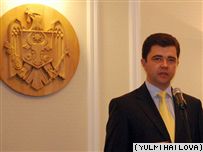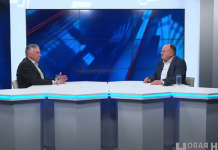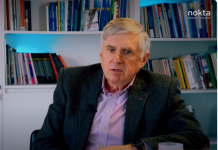Corneliu RUSNAC, moderator Imedia: Good day. I am Corneliu Rusnac and I invite you to a new broadcast of discussions on topics of foreign policy, produced with the support of the „Foreign Policy Association” and financed by „Friedrich Ebert” Foundation.
In today’s show I would like to present you a discussion with Mr. Victor Osipov, Deputy Prime Minister, responsible within the government for the settlement of the transnistrian problem. Recently Victor Osipov visited Brussels and Washington where he met senior officials from EU and U.S. I asked Mr. Osipov what was the purpose and what were the results of these visits?
1.The purpose and the results of Mr. Osipovs visit to EU and U.S.
Victor OSIPOV, Deputy Prime Minister of the Republic of Moldova: These are visits in the framework of bilateral consultations tour on the transnistrian problem, a tournament which began in Moscow. We went there first, not just because the agenda of certain officials we met would dictate so, but also because the Russian Federation, obviously, is a very important player in the region in general and in the transnistrian conflict settlement, in particular. The subject is the same. Try, on the one hand, to expose and explain the new approach of the Government in Chisinau regarding the reintegration of the country, settlement of the transnistrian problem, the negotiation process with all its components that are discussed today within the government and publicly in the society, to find out the reactions of our partners in the 5 plus 2 negotiation process, reactions to the Moldovan Government’s actions. On the other hand, to find out what are the visions of our partners regarding the ways, the prospects for the settlement of the transnistrian problem, there view on certain specific problems we raised in this context. We are discussing the same thing in all capitals. We will continue this tour, as a matter of fact we are trying to make these negotiations more transparent, or rather consultations, and we present publicly their results as soon as we have everything summed up. We are going to do the same after our visit to Washington as well.
But I would mention that when talking about EU and U.S., a particular point on our bilateral agenda falls within one of the objectives announced by the new government of Moldova, to enhance the role of EU and U.S. in the process of reintegration of the Republic Moldova and in the transnistrian conflict settlement process. The two actors currently have observer status in the format of negotiations. Changing this status is a rather complicated matter in itself, and that would take time, energy, and requires the consent of the current mediators Russia, Ukraine, OSCE and the parties Chisinau and Tiraspol, which I do not think would be easy to obtain within a period of short time. However, given the clout of EU and U.S. in international politics, including security-related policy and settlement of frozen conflicts, both actors have sufficient tools to play a much more consistent role in the settlement of the transnistrian problem. Here I may perhaps especially refer to their ability to provide technical assistance, through their expertise but also financial assistance for development projects in the eastern districts of Republic of Moldova, for the integration process itself, for confidence-building measures, as they are usually called on the right bank of the Nistru and on the left. Because you asked me to mention the results, I must say that both partners have accepted our view in this regard and we came out with clear promises that they will examine the possibilities to complementing, enhancing their involvement, and increasing the assistance offered to the Republic of Moldova in this context.
Corneliu RUSNAC: How compatible is Russia’s position on the transnistrian problem compared with that of the EU and U.S. in this process?
2. Compatibility of Russia’s position with that of the EU and the European Unions stand on the transnistrian issue
Victor OSIPOV: If we talk based on statements, on public attitudes I would note with satisfaction that over the last year, along with other partners in the negotiations, the Russian Federation subscribed on several occasions to the principle that preserves our major national interest: independence, sovereignty and territorial integrity of Republic of Moldova in its internationally recognized borders. This principle has been fixed at the meeting of October 6, in the three plus three format in Vienna without the participation of Chisinau and Tiraspol, mediators and observers had a meeting and made a joint statement. Subsequently, on various occasions, including during the negotiations in the framework of bilateral consultations that we had in Moscow, Russian officials mentioned that Moscow still subscribes to the principle of integrity, sovereignty and territorial integrity of Republic of Moldova. Moreover, I would note, in order to maybe anticipate a question that the new President of Ukraine Viktor Yanukovych during a meeting with Kanat Saudabayev, the OSCE chairman, reiterated his support for that principle, the very same basic reference point of the transnistrian conflict settlement, adding that he sees the solution by offering a special status of wide autonomy to the region concerned. The fact that this fundamental principle of Republic of Moldova’s strategic interests was strengthened by some mentioning in recent months, I think is an important asset for us and for the negotiation process. As regarding certain specific development within the negotiations processes, I must mention again that my interlocutors in Moscow supported the positive and constructive approach, pragmatic approach of the new government of Republic of Moldova in respect to the transnistrian region, particularly confidence-building measures. I would also mention that all partners in the 5 plus 2 format, on 1st and 2nd of March in Vienna, at our last informal meeting agreed to set our goal on resuming the formal negotiations during the year 2010. I must, however, mention that subsequent reactions from the side of Tiraspol were hesitant with regards to the chances of resuming negotiations…
Corneliu RUSNAC: That is precisely what I wanted to ask you, how open is Tiraspol now to negotiations with Chisinau in the 5 plus 2 format?
3. Tiraspols receptivity to resume negotiations with Moldova in the 5 plus 2 format
Victor OSIPOV: It is premature to make an assessment in this regard. I tell you that what constitutes an official reference point was mentioned in the press statement of the Kazakh OSCE presidency in Vienna in early March, it is the agreement to resume these negotiations. However, the subject is sensitive and political situation is very complicated, both on the right bank and the left one. That is why we say, and I will not hesitate to repeat, I think we should not create illusions and exaggerated expectations. Because when you announce too optimistic expectations you risking falling into pessimism afterwards, into dissatisfaction and I do not think it appropriate to force the note. We will see how far Tiraspol is ready to return to the negotiation table. I want to say that with the change of power we have changed the tactics and the atmosphere of the discussions. From an environment of verbal confrontation, and not only verbal, and through actions, to an atmosphere of collaboration, to the development of joint projects aimed at solving common, specific problems facing the population.
We noted that this change also required from Tiraspol a certain time for adjustment. It is not so easy to change the language and approaches of both sides. We did it but I think we should have patience with the transnistrian side and especially we should do what represents the essence of our work – to strengthen confidence. Trust does not appear in such a short period of time of only several months. There is a need to demonstrate for a longer period of time that what you do is sincere, with all good will and with a single purpose, to help solve problems generated by conflicts or arising as a result of the current situation of division between left and right bank. And my belief is that as we confirm, through ourselves and our coherent actions that we fulfill this commitment to act positively in relations with transnistria and to act constructively and productively to solve problems, as we confirm our efficiency, this approach will increase the confidence level and availability of Tiraspol for discussion and development of contacts as well.
Corneliu RUSNAC: To what extent does Russian military presence in Transnistria impede the transnistrian settlement process?
Victor OSIPOV: Depends on how you approach it. The presence of a small contingent of Russian troops in Transnistria is not in itself, so to speak, a military factor, or does not result primarily in a military factor. Rather, the predominant effect is the political factor. It is a symbol of moral support for those who share the position of the authorities in Tiraspol. It has a symbolic value, in general, and for the Russian Federation, probably more than military, and I say again, it depends on how you deal with this issue. I think we need to deal pragmatically. We need to see the development of the process recognizing first, that most Russian troops have already been withdrawn from Transnistria. About half of Russian ammunition was removed from the region. However, these processes were halted at a certain moment. I do not want to dwell on the reasons stated, at least, because I think there are many reasons that were not declared why this had been done, and I referred to them above when saying about the political or moral importance, if you will, of this presence in Transnistria but it poses a risk. In particular munitions are an imminent risk, considering that in recent years we have witnessed a number of serious accidents which occurred on the territory of Russia and in Ukraine with such massive deposits of ammunition. Therefore, I want to say that this worries Ukraine as well and it should worry first of all the Transnistrian population and it obviously disturbs us too. So, this should be brought to an end.
The most constructive position on the side of certain factors in Moscow or the one that seemed more open suggests returning to these issues after we have achieved positive developments in the relations between Chisinau and Tiraspol within the negotiation process. Why am I saying this, in order to emphasize that it is a position which leaves the door open for further discussions on these topics. Moreover, one argument or one of the issues we talked about regarding the peacekeeping mission, which was established when it was established, in a framework that was agreed at that time. Currently we have a huge stock of experiences that show how this peacekeeping mission works. Undoubtedly, it was a stabilizing factor, especially in the security area and, fortunately or to our luck, we have had a peaceful environment in this area since that time, with minor exceptions.
At the same time, however, a number of incidents reveal imperfections of the peacekeeping mechanisms. Including, it appears that sometimes, when an incident occurs, because of lack of consensus, even military observers cannot move to that particular place to take records of it. It is a semi-paralyzed tool and the Joint Control Commission meetings are extremely strenuous and decisions are taken very difficultly either on the reports about the security situation in the area or even more so about settling disputes, because the same principle of consensus applies here as well. In many ways the mission and its internal institutions are broken or partially broken. This was accepted by the interlocutors in Moscow with whom we discussed the subject. We have not discussed it with everybody. We addressed it only with those who deal with it. It was accepted also that we must talk about improving the peacekeeping mission. Again, why I mention it? Because it shows that there is some openness to these very sensitive issues for high ranking officials from the Russian Federation responsible for this topic in Moscow.
Corneliu RUSNAC: But how does the Republic of Moldova see the improvement of this peacekeeping system?
4. Republic of Moldova’s vision for improving the peacekeeping system
Victor OSIPOV: I do not think that there may be a clear cut answer. We have clearly outlined objectives and these objectives mean: complete withdrawal of Russian troops; complete withdrawal, disposal or destruction of the ammunition; modification, transformation or replacement of the current peacekeeping mission to a mission of civilian observer under an international mandate. They are the objectives. But I would like to mention concurrently that these objectives can be achieved only through negotiations and consensus of all those involved in the settlement process. Unilateral actions are not possible because it would be counterproductive. And it is very clear that it can destabilize the situation. All these things, all these parameters are clear and hence diplomatic work, the work of experts who are to produce a fair and detailed analysis of the current mission capability, mechanisms, strengths, weaknesses and who should offer relevant recommendations on how to achieve the political goals and national objectives that we have set. The entire work is under way, it may be even in its initial phase because, unfortunately, we find, after taking power and in this case after taking the mandate on the transnistrian settlement that the Moldovan authorities had no strategic approach to solving this conflict until now. Government and the country lack a strategy in this respect. We are only yet to produce it, unfortunately, both at national and sectorial levels and also on these specific issues. To venture, to give feedback, suggestions, and make public statements, especially as a representative of the central government or national political leadership is risky because you can make mistakes due to lack of expertise, without a common strategic approach, which for that matter would be shared by the entire political class and even the whole society or by most of the civil society, community experts. Only this way can we ensure consistency in Republic of Moldovas actions in the transnistrian settlement process and protect this consistency including from policy changes and changes of leadership.
As everybody can see very well, we have not rejected the instruments that were developed and implemented before the arrival of the new government. We have changed the attitude, changed the approach, we have enhanced the activity, and we have identified the weaknesses, including lack of a strategic approach and now we are developing these consultations with all our partners so that we can proceed to developing such a strategy, as well as setting up very practical plans to address sectorial issues. But we have kept the working groups confidence building instruments; adherence and support for the international 5 plus 2 format; the format of bilateral dialogue to promote existing problems in the field. There are some moments confirming that we are consistent in this respect and consistency is an important criterion for the Republic of Moldova to reach its strategic goal of reintegration which is not a short term goal but rather a long-term one. This is already clear.
Corneliu RUSNAC: Could the elections that are to be held in transnistria and those elections which are likely to take place here as well lead somehow to a halt in the transnistrian settlement process?
5. The impact of elections on both banks of the river Nistru on the transnistrian settlement
Victor OSIPOV: Instability, or temporary mandate of the state institutions, obviously affect all other processes and even more so a process that is so sensitive as are the negotiations on the transnistrian problem. However, we have objectives that are very practical. I refer to confidence-building measures and development projects that should be started and should go on despite any further changes, especially since they are backed by the opposition, which is the former government that had initiated them, as well as by the current administration. Also, on the left bank of the Nistru, as one can see, both the current administration in Tiraspol and, given that now the political landscape there is becoming more diverse, those in opposition to the administration, which, currently are holding the majority in the so called Verkhovnii Soviet in Tiraspol, everyone understands that this is a correct direction and must be followed. Practical measures should continue. To what extent we can undertake commitments to a political settlement, I think to a much smaller extent because of proximity to election cycles. And never has election speculation or populism ever helped the process with such high sensitivity. Therefore, we are aware that real progress in negotiations, their substantial advancement can only be possible after the stabilization of power institutions. Being aware of this allows us to focus on preparing strategies and we can again use this time for developing, on the one hand, and on the other hand, at present it is clear that we do not have a settlement formula to be discussed during negotiations. Consequently, there does not exist, even if there were an exemplary political stability in Chisinau and Tiraspol, the "risk to achieve a short term solution, or for a very short period of time." We must be very aware of this and not fall into an exaggerated panic regarding the subsequent elections. I think that the process will run normally, there are no exaggerated expectations, formulas are yet to be developed and negotiated and it is a long-term task, therefore we must continue our work at all levels: in the five plus two format, during the bilateral dialogue, within confidence-building groups, attracting support for development projects in the area, trying to find solutions to serious problems with high impact, such as those relating to the operation of railways, the lack of telephone connection between fixed networks of the left bank and the right one, and problems affecting the population at large or the economy. And these things that are largely technical, although they clearly need political support, decision and political will, or conversely, political will and decision, these problems have a subtext, or a settlement which is utmost technical and we should, in this sense, use the break imposed by the political situation upon political negotiations to solve real problems.
Corneliu RUSNAC: Dear listeners, I remind you that you have listened to a discussion with Deputy Prime Minister Mr. Victor Osipov. Here we finish our program today. The show was carried out with the support of the Foreign Policy Association and funded by the Friedrich Ebert Foundation. I, Corneliu Rusnac, am saying goodbye and expecting you for a new broadcast. See you soon!







